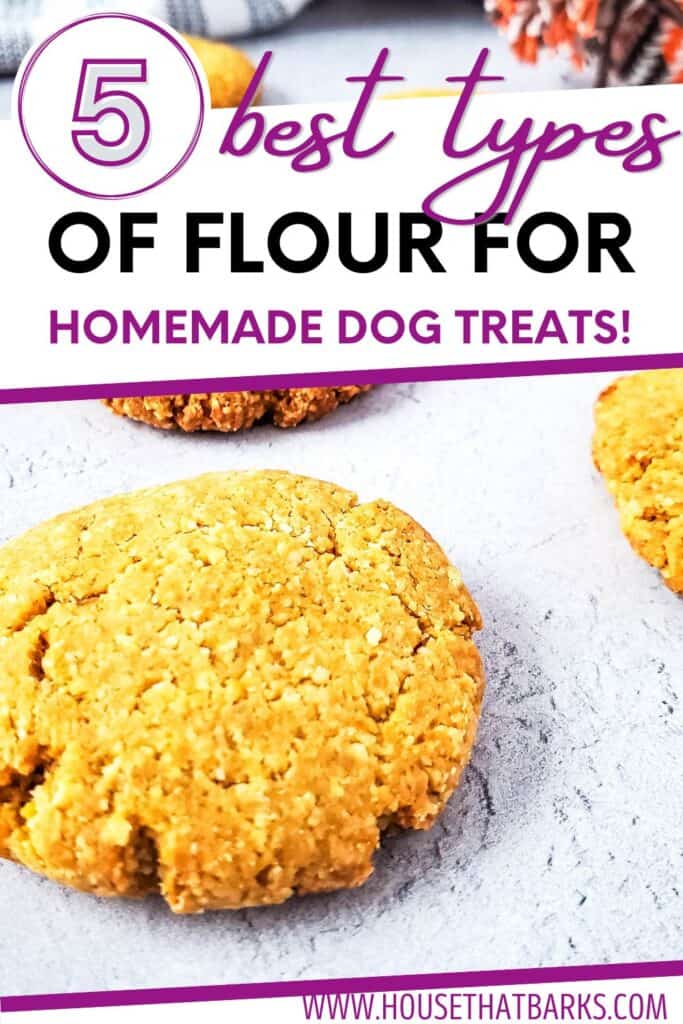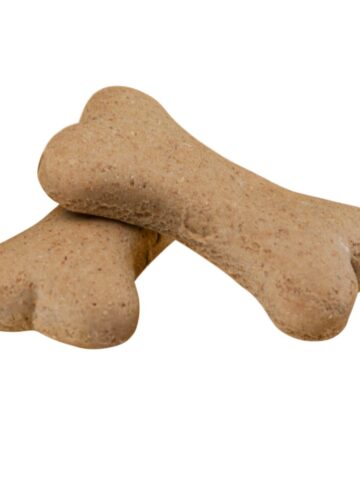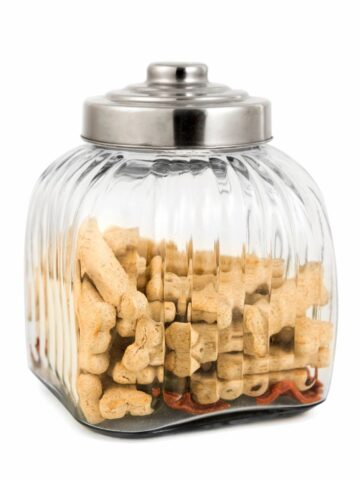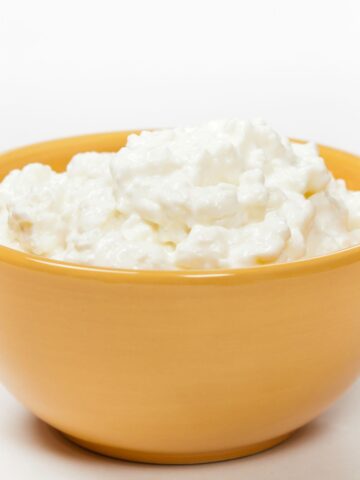Trying to decide which are the best types of flour for your dog treats?
As the saying goes, "dogs are man's best friend." And as pet owners, we always want what's best for our furry companions.
That's why when it comes to making homemade dog treats, choosing the right type of flour is important.
So let's take a closer look at the different types of flour that are commonly used in making dog treats and discuss the benefits and drawbacks of each.
We'll also dive into some things to consider when choosing flour for your dog treats, such as nutritional value, taste, and texture.

Disclosure: Some of the links in this article are affiliate links (Amazon Associate or other programs we take part in). As an Amazon Associate, I earn a small commission from qualifying purchases.
Best Types of Flour for Dogs
When making homemade dog treats, it's essential to use ingredients that are safe and beneficial for your furry friend.
The best flour for dog treats is one that is both healthy and easily digestible for dogs.
Here are some options you can consider:
1.Whole Wheat Flour - Whole wheat flour is a common choice for homemade dog treats. It contains more nutrients and fiber than all-purpose flour. However, some dogs may be sensitive to gluten, so be mindful if your dog has any grain-related allergies or sensitivities.
2. Oat Flour - Oats are a good source of dietary fiver and can be a great alternative to wheat flour. You can buy oat flour directly, or you can make your own by grinding rolled oats in a food processor.
3. Brown Rice Flour - Brown rice flour is gluten-free and gentle on your dogs tummy. It's an excellent choice if your dog has grain allergies or sensitivities.
4. Chickpea Flour (Garbanzo Bean Flour) - Chickpea flour is gluten-free and offers a good amount of protein. It's a suitable option for dogs with grain allergies.
5. Coconut Flour - Coconut flour is high in fiber and low in carbohydrates. It can be a good option for dogs that need to manage their weight or have grain allergies.
Choosing the Best Types of Flour for Dog Treats
Always introduce ingredients gradually, especially if your dog hasn't had them before, to watch for any signs of allergies or flour sensitivities.
Plus, if you're using any other ingredients in the treats, be sure they are safe and non-toxic for dogs (example: peanut butter with no xyltiol).
Before introducing homemade treats or making significant changes to your dog's diet, it's a good idea to consult with a veterinarian to make sure your dog's health and specific dietary needs are considered.
Opt for Whole Grain Flour
Opting for whole grain flour is one of the best choices you can make.
Whole grain flour is made from the entire grain, including the bran, germ, and endosperm.
As a result, it contains more fiber, protein, and nutrients than refined flour.
- Whole grain flour is slower to digest, which means it can help regulate blood sugar levels and keep your dog feeling fuller for longer periods of time.
It can also help in maintaining digestive health and promote regular bowel movements.
By choosing whole grain flour, you can feel good that your dog is getting the best possible nutrition from their treats.
Choosing Gluten-Free Options
Gluten-free flour can help minimize potential problems which are important for dogs with gluten sensitivities or allergies.
- Some gluten-free flour options to consider include almond flour, coconut flour, and chickpea flour, all of which offer different textures and nutritional benefits.
Hint: Gluten-free flour may require different rations and adjustments in recipes compared to traditional wheat flour.
Therefore, you may need to experiment by adding or reducing water, to your recipes.
Low-Carb Flour Varieties
Some flour can cause spikes in blood sugar levels in certain dogs, leading to weight gain and other health issues in dogs.
If you have a pup with some insulin or health issues you may want to consider low-carb flour varieties.
- Examples of low-carb flours include almond flour, coconut flour, and flaxseed meal.
These flours are not only low in carbs, but rich in nutrients such as protein, fiber, and healthy fats, making them a great choice for your furry friends homemade dog treats.
High-Protein Flour
In addition to low-carb, some flour is equally high in carbs.
- These types of flours such as almond flour, chickpea flour while low carb, also contain more protein per serving than traditional wheat flour.
This added protein can help support your dog's muscle development and provide sustained energy throughout the day.
High-protein flours are often gluten-free, low-carb, which makes them a great option for dogs with gluten sensitivities.
When using high-protein flour for homemade dog treats, be sure to follow recipes and measurement guidelines carefully, as they may require adjustments to traditional wheat flour.
Consider Alternate Grain Flours
Another option when making dog treats is grain flours.
These flours are made from grains other than wheat and can offer a range of benefits.
- For example, coconut flour is high in fiber and low in carbohydrates, making it ideal for dogs with grain sensitivities or diabetes.
- Buckwheat flour is gluten-free and rich in protein, making it a great choice for dogs with gluten allergies or who need extra protein in their diet.
Go for Natural, Unbleached Flour
One of the best options for making healthy, wholesome dog treats is natural, unbleached flour.
Unlike bleached flour, which has been chemically treated to lighten it's color and texture, natural, unbleached flour is minimally processed and retains more of it's original nutrients and fiber.
This type of flour is also free from potentially harmful chemicals and additives that can negatively impact your dog's health.
Natural, unbleached flour has a slightly nuttier taste that can add a delicious twist to your dog treat recipes.
Organic Flour for Health-Conscious Dogs
Organic flour is a popular choice among health-conscious dog owners for several reasons.
First, organic flour is typically free from harmful chemicals, pesticides, and herbicides that can harm your dog's health.
Plus organic flour is often higher in nutrients and fiber content compared to conventional flour, which can contribute to better digestion and overall health for your furry friend.
It's important to note that while organic flour may be a more expensive option, the benefits it offers make it a worthwhile investment in your dog's well-being.
Final Thoughts on Best Types of Flour for Homemade Dog Treats
Choosing the right type of flour when making dog treats is crucial for your dog's health.
While it may be tempting to use any type of flour on hand, it's important to opt for flour that is free of harmful additives and rich in nutrients for your furry friend.
Whether you choose whole wheat, oat, or coconut flour, make sure to do your research and select high-quality ingredients that will not only make your dog's treats delicious, but also keep them healthy.
With the right ingredients, you can prepare tasty and nutritious dog teats your furry friend will love.






Leave a Reply